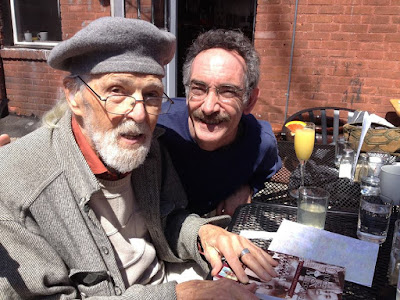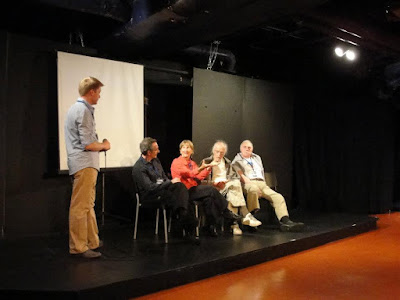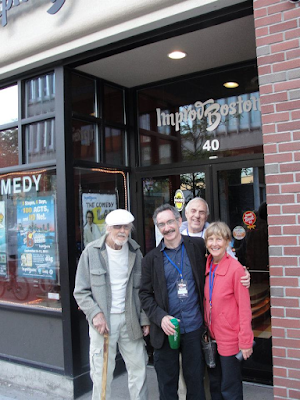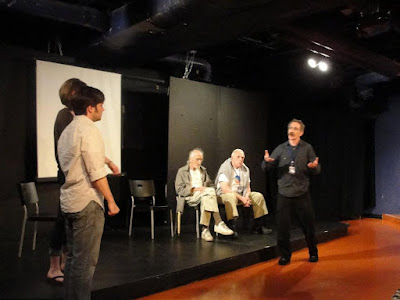David Shepherd and the ImprovBoston Festival by Michael Golding
[ad_1]
My close friend
and mentor for 46 years, David Shepherd, the father of improvisation, passed
away on December 17, 2018. He was 94 years old. With Paul Sills, David created
Compass (1955), the first professional improv cabaret in North America and
forerunner of Second City (1959). With Howard Jerome, David created the Improv
Olympics (1972) which inspired the Canadian Improv Games (1977, created by
Howard Jerome and Willie Wyllie) and i.O. (1981, founded by Charna Halpern and
Del Close). In 1998, David brought MOVIExperience, his improvising movies
with nonprofessionals format to Pioneer Valley, Massachusetts. Nancy Fletcher, one of the MOVIExperience participants, believed the format could be used to build confidence and character in
adolescent girls and founded Act Now! (2000). David’s last format was Life-Play
(2009), improv games designed to be played over the phone.
 |
| David Shepherd & Michael Golding |
David
Shepherd suffered from manic depression most of his adult life. His wild mood
swings were at times terrifying for me in my early teens. Paul Sills had a gift
for being able to diffuse David’s temper and I’d like to think that I learned
from the best. I felt the two were polar opposites when it came to temperament,
which is why I was surprised to learn in Jeffrey Sweet’s “Something Wonderful
Right Away” that Paul had a formidable temper of his own. I remember thinking
“I know not this Paul Sills people are talking about.” Paul was always warm,
funny and supportive in the workshops I took with him. He never threw a chair
at me (not even an imaginary one), which was a recurring memory from the
founding members of Playwrights Theatre Club, Compass and Second City.
Through
David’s association with ImprovBoston, we had arranged for his documentary “David
Shepherd: A Lifetime of Improvisational Theatre” to be screened at their annual
festival in 2011. It would include a Q & A session with me, David, Howard
Jerome and Nancy Fletcher and a workshop demonstration of
Life-Play, David’s latest format. I
agreed to fly to Belchertown from Los Angeles so that I could drive with David
and Nancy to the event.
When I
arrived in Belchertown, David surprised me with the news that he planned on
showing an instructional Life-Play video after the screening, aiming towards
selling copies to the audience. I told him that was not the agreement with the
festival and Life-Play was already represented quite well in the
documentary. David was not pleased with
that answer and wanted me to approach the festival about changing the program.
By nightfall
Howard arrived from Toronto. I had heard back from the festival. We were going
to stick to the original plan. David was incensed, ranting about how hard he
worked on the videos. Willie Wyllie, the executive producer of the documentary
called David from Ottawa (responding to my S.O.S. text) hoping to reason with
him. The work on the videos wasn’t wasted. He just couldn’t show or sell them
at the screening. The focus was on the documentary and the fine work of our
director, Mike Fly and writer, (me). David had an enormous amount of respect
for Willie, who could always be counted on to give the final word he would accept.
Willie was successful once again.
Howard and I
agreed to look at the video so that David could get our feedback. It was
dreadful. Poorly lit, bad editing and hard to follow. Not the best
representation of David’s work and we told him that. His cork popped; “Fuck it!
I’m getting too old for this shit! I can’t do this anymore, schlepping from
place to place trying to get gigs and selling my formats!” Of course, none of this was the case with the
festival, where he was to be honored.
Maybe he couldn’t accept that even though the documentary was about him,
it wasn’t his project and he needed to focus on something where he had some
control. To David, the documentary represented the past, Life-Play, the present
and future. So that evening the three of us in an instant went from a loving
reunion to a lot of yelling and “fuck you!”
Next
morning, I greeted David with my usual “Good morning, Mr. Shepherd. How are we
today?” David somberly replied, “I can’t wait for this day to be over.” I
laughed; “Atta boy. That’s the spirit.” My approach whenever David was in the
dark zone was to treat his every response with optimism, love and humor. Howard was already on his way to Boston to
catch some shows before our screening.
Once we were
in the car and on the road, (me at the wheel, David in the passenger seat and
Nancy in the back), he relaxed considerably. Road trips were a big part of our
relationship and we seamlessly eased into our travel banter – improv, expanding
Life-Play, future projects, my work with at-risk populations. We picked up
lunch from MacDonald’s on the way, and David slowly fed me French fries one at
a time as I drove. I loved that. When we
arrived in Boston, David was wide-eyed. It had been a while since he’s been
there and was fascinated by the architecture and people. By the time we arrived
at the theatre, David was in a playful, joyful mood.
Well, that
quickly ended as the audience entered for the screening. The event wasn’t well
publicized and there were about 25 people in the audience. David glared at me
and I could see that he was ready to determine that the screening was going to
be a humiliating failure for him. Just
then, a young woman sitting behind David started talking about how excited she
was to see the documentary. She had driven with friends from Rhode Island, was
currently reading The Compass by Janet Coleman (who was also in the
documentary) and was hoping that she could get to meet David Shepherd. I turned around and said, “Are you aware that
the father of improvisation is sitting right in front of you?” She exploded
with excitement. A sly smile appeared on David’s face as she showered him with
appreciation. After they talked a bit, David turned around and the house lights
started to dim. I leaned over to David and whispered, “that didn’t suck, did
it?” “No. It did not.” He patted my knee
affectionately.
This was the third time I had watched the documentary from
start to finish with David and he’s always totally engrossed. I could only
imagine what memories sparked inside him with every viewing. The audience while small, was extremely
responsive. As the end credits rolled,
David whispered, “that was excellent.” His standard response, always with a
tinge of amazement in it. I was happy to
see Carman Dewees at the screening. He, along with Chris Britt, developed
Life-Play with David. Carman and David had a falling out due to David’s
unreasonable demands (a constant with partners David has collaborated with over
the years) and had not spoken for some time.
David was sincerely pleased to see Carman and the two had a warm, brief reconciliation. After they spoke, David confided in me that
he accepted full responsibility for Carman leaving Life-Play. Carman was solely
responsible for the launch and initial success of Life-Play, recruiting
players, setting up conference calls and putting together a polished handbook
of the format’s games with essays from me, David, Howard and himself. David
realized he had let a gem slip through his fingers.
The Q &
A portion went well, as did the Life-Play demonstration, which I conducted with
volunteers from the audience. David and Howard side-coached some of the games.
Originally scheduled for ten minutes, I ended up doing a half hour because it
was going so well. Jeremiah Jordan, the artistic director of the festival who
was watching from the side gave me the okay. When it was over, we had to
quickly leave the theatre for the next event to set up. The audience followed
us out into the lobby, enveloping David with attention, then outside the
theatre, then joined us for dinner at a restaurant down the block. David was energized, talking improv and
meeting new people.
 |
|
Q&A moderated by Jeremiah Jordan with Michael Golding, Nancy Fletcher, David Shepherd and Howard Jerome. Setting up Life-Play guidelines with two volunteers. |
 |
| David Shepherd and Howard Jerome side-coach two volunteers playing a Life-Play game. |
Driving
home, I fielded calls from Mike Fly and Willie Wyllie. It was a ninety-minute drive and I was
pushing the speed a bit. With David holding the phone to my ear and Willie
draining me for every detail, I tell my improv brother that “the life of the
father of improvisation is in my hands right now so maybe I should focus on my
driving.” For the rest of the drive, we talked about all the new people we met
at the screening and how David was going to recruit them for future projects.
He had given out all his business cards. He was happy.
Back at the
house, Nancy goes immediately to bed and David and I stay up for a while,
sharing a joint. Yes, I was smoking with an 87-year old man. It was a long
active day. Navigating David’s emotional minefields can be draining, but now I
was getting stoned, playful, fun, David. It made the day worthwhile for me.
After we say
our goodnights I walk towards my room. David sings out “Michael!”
“Yes,
David?”
“You’re an
excellent workshop director.”
“Thank you,
David. I had a great teacher.”
“Thank you.”
For a moment
I thought about screwing around with him by adding “Oh, you thought I meant
you?” But it would have ruined a perfect moment. And it would have been a lie.
Next morning
David wanted to know when we were going on our next road trip.
 |
| David Shepherd, Michael Golding, Howard Jerome and Nancy Fletcher at ImprovBoston, 2011. |
Michael Golding is a writer, director and improv teacher. He can be contacted for workshops, festivals and private consultations at migaluch@yahoo.com. Michael participated in the evolution of the Improv Olympics and Canadian Improv Games. Artistic director of the Comic Strip Improv Group in N.Y. and created the Insight Theatre Company for Planned Parenthood, Ottawa. He is a faculty member at El Camino College in Los Angeles, working with at-risk teens and traditional students. He wrote and co-produced the documentary “David Shepherd: A Lifetime of Improvisational Theatre” (available for free on YouTube). His book, “Listen Harder,” a collection of essays, curriculum and memorabilia on improvisation and educational theatre is available on Amazon, Barnes & Noble and CreateSpace. Michael holds a BFA degree in Drama from New York University’s Tisch School of the Arts and an MA degree in Educational Theatre from NYU’s Steinhardt School of Culture, Education and Human Development.
[ad_2]
Source link
